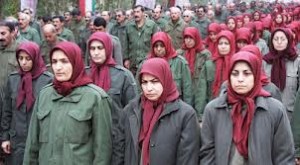 BAGHDAD � The survivors of a mass killing in an Iraqi camp housing Iranian exiles were moved during the night to another camp on the edge of Baghdad, the United Nations said on Thursday.
BAGHDAD � The survivors of a mass killing in an Iraqi camp housing Iranian exiles were moved during the night to another camp on the edge of Baghdad, the United Nations said on Thursday.The Iraqi authorities ordered the transfer of the 42 in the wake of violence in Camp Ashraf in the central Iraq province of Diyala on September 2 in which 52 members of the People's Mujahedeen Organisation of Iran died.
The authorities blame infighting within the PMOI for the deaths, and insist no soldiers entered Ashraf.
Those accounts are sharply contested by the PMOI, which charges that Iraqi forces entered the camp, killed 52 of its members and set fire to the group's property and goods.
The 42 remaining residents of Ashraf moved during the night to Camp Liberty, a former US military base on the outskirts of Baghdad where some 3,000 other members of the group are housed, according to Eliana Nabaa, spokeswoman for the UN mission in Iraq.
Seven residents of Camp Ashraf -- six women and a man -- disappeared during the violence, according to the PMOI.
The UN has urged Iraq to investigate the disappearances but there has been "nothing so far", Nabaa told AFP.
Baghdad has opened a probe into the events surrounding the deaths in the camp, but accounts of events that day still differ markedly.
The UN and Western governments have condemned the bloodshed, but have been careful not to assign blame.
Those housed at Camp Liberty are awaiting relocation outside of Iraq.
"Resettlement outside Iraq is now the priority, and it is urgent that countries ready to host the residents come forward to accept them, providing them a safe future outside Iraq," UN deputy special envoy Gyorgy Busztin said in a statement.
For years, the UN has been searching for countries willing to host the exiles. In June, Albania accepted 71 PMOI members and Germany has promised to receive 100.
The group, also known as the Mujahedeen-e-Khalq, was founded in the 1960s to oppose the shah of Iran. After the 1979 Islamic revolution that ousted him it took up arms against Iran's clerical rulers.
The late Iraqi dictator Saddam Hussein allowed the MEK to set up the camp during his war with Iran in the 1980s.
The group says it has now laid down its arms and is working to overthrow the Islamic regime in Iran by peaceful means.
By AFP
The Iran Project is not responsible for the content of quoted articles.










